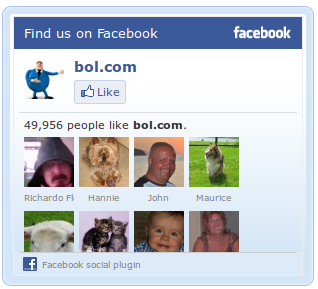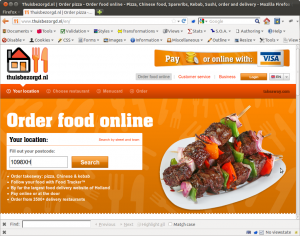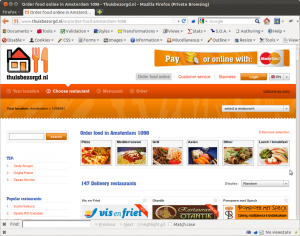UPDATE 2018-12-26: Europese Hof van Justitie buigt zich over privacy schending door like buttons (TelecomPaper, in Dutch)
If you walk into a store, would you appreciate it if the store owner phoned a random stranger to tell him/her that you are at their store? Probably not. Because it’s weird. Because it serves no purpose to you. Because you feel it could, in fact, be harmful to you. Or simply because you feel it is none of their frickin’ business. To put it more eloquently, it intuitively constitutes a violation of contextual integrity.
Yet, that is exactly what happens when you visit many websites.
To me, Facebook is equivalent to a random stranger. And every time I visit a website that has a Facebook `Like’-button, that website makes my browser disclose that visit to Facebook, despite the fact that I do not have a Facebook profile. When I visit Dutch online bookstore Bol.com, their website makes my browser send the following HTTP request to www.facebook.com:
GET /plugins/likebox.php?href=http%3A%2F%2Fwww.facebook.com%2Fbolpuntcom&width=292&height=260&colorscheme=light&show_faces=true&border_color=%23EEEEEE&stream=false&header=true HTTP/1.1
Host: www.facebook.com User-Agent: Mozilla/5.0 (X11; OpenBSD i386; rv:5.0) Gecko/20100101 Firefox/5.0
Accept: text/html,application/xhtml+xml,application/xml;q=0.9,*/*;q=0.8
Accept-Language: en-us,en;q=0.5
Accept-Encoding: gzip, deflate
Proxy-Connection: keep-alive
Referer: http://www.bol.com/nl/index.html
The Referer-header discloses to Facebook that I’m visiting Bol.com. Chances are that if Facebook would want to, they could easily identify me by matching my IP address + HTTP headers to data collected by themselves or (other) private intelligence agencies (.pdf) during my prior (non-anonymous) online purchases and my (non-anonymous) social media activity.
When I visit Dutch take-away food ordering webshop ThuisBezorgd.nl, my browser fetches a page from Facebook, Twitter, Google and Hyves (Hyves is a Dutch/Belgian social network):
So, effectively, ThuisBezorgd.nl makes my browser tell four random strangers my identity and that I’m interested in take-away dinners.
In case of ThuisBezorgd.nl there is another subtlety. Whenever I visit the website, I have to fill in my postal code:
When clicking the `Search’-button, my browser opens http://www.thuisbezorgd.nl/en/order-food-amsterdam-1098 :
…that URL contains the four numbers of my postal code at the end. Indeed, that page too makes my browser fetch content from Google’s systems. Now, thanks to the Referer-header, the postal code I provided is disclosed to Google as well. Specifically, it is disclosed to www.googleadservices.com, www.google-analytics.com and googleads.g.doubleclick.net:
GET /pagead/conversion/1071768439/?random=1337601791571&cv=7&fst=1337601791571&num=1&fmt=3&label=HMtdCNrcuAEQ98aH_wM&bg=666666&hl=en&guid=ON&u_h=1080&u_w=1920&u_ah=1080&u_aw=1920&u_cd=24&u_his=6&u_tz=120&u_java=true&u_nplug=8&u_nmime=81&ref=http%3A//www.thuisbezorgd.nl/en/&url=http%3A//www.thuisbezorgd.nl/en/order-food-amsterdam-1098&frm=0 HTTP/1.1
Host: www.googleadservices.com
User-Agent: Mozilla/5.0 (X11; OpenBSD i386; rv:5.0) Gecko/20100101 Firefox/5.0
Accept: image/png,image/*;q=0.8,*/*;q=0.5
Accept-Language: en-us,en;q=0.5
Accept-Encoding: gzip, deflate
Proxy-Connection: keep-alive
Referer: http://www.thuisbezorgd.nl/en/order-food-amsterdam-1098
GET /__utm.gif?utmwv=5.3.1&utms=4&utmn=1587224412&utmhn=www.thuisbezorgd.nl&utmcs=UTF-8&utmsr=1920×1080&utmvp=1024×605&utmsc=24-bit&utmul=en-us&utmje=1&utmfl=11.2%20r202&utmdt=Order%20food%20online%20in%20Amsterdam%201098%20-%20Thuisbezorgd.nl&utmhid=1647671063&utmr=0&utmp=%2Fen%2Forder-food-amsterdam-1098&utmac=UA-2290863-1&utmcc=__utma%3D251997388.1444340185.1337593125.1337599450.1337601573.4%3B%2B__utmz%3D251997388.1337593125.1.1.utmcsr%3D(direct)%7Cutmccn%3D(direct)%7Cutmcmd%3D(none)%3B&utmu=q~ HTTP/1.1
Host: www.google-analytics.com
User-Agent: Mozilla/5.0 (X11; OpenBSD i386; rv:5.0) Gecko/20100101 Firefox/5.0
Accept: image/png,image/*;q=0.8,*/*;q=0.5
Accept-Language: en-us,en;q=0.5
Accept-Encoding: gzip, deflate
Proxy-Connection: keep-alive
Referer: http://www.thuisbezorgd.nl/en/order-food-amsterdam-1098
GET /pagead/viewthroughconversion/1071768439/?random=1337601791571&cv=7&fst=1337601791571&num=1&fmt=3&label=HMtdCNrcuAEQ98aH_wM&bg=666666&hl=en&guid=ON&u_h=1080&u_w=1920&u_ah=1080&u_aw=1920&u_cd=24&u_his=6&u_tz=120&u_java=true&u_nplug=8&u_nmime=81&ref=http%3A//www.thuisbezorgd.nl/en/&url=http%3A//www.thuisbezorgd.nl/en/order-food-amsterdam-1098&frm=0&ctc_id=CAIVAgAAAB0CAAAA&ct_cookie_present=false HTTP/1.1
Host: googleads.g.doubleclick.net
User-Agent: Mozilla/5.0 (X11; OpenBSD i386; rv:5.0) Gecko/20100101 Firefox/5.0
Accept: text/html,application/xhtml+xml,application/xml;q=0.9,*/*;q=0.8
Accept-Language: en-us,en;q=0.5
Accept-Encoding: gzip, deflate
Proxy-Connection: keep-alive
Referer: http://www.thuisbezorgd.nl/en/order-food-amsterdam-1098
Cookie: id=ccfc97b450000c1||t=1337591014|et=730|cs=002213fd4815288209299939c3
(Yes, GeoIP services may already reveal the geographical location of an IP address with more precision and accuracy, but that is besides the point.)
Information disclosure via these types of web bugs is old and well-known. In fact, EFF’s The Web Bug FAQ dates back to 1999. But the problem is becoming more relevant now that those third parties are used by 100M+ people and more and more personal data is collected and sold in the market.
Besides a violation of your visitors’ privacy, loading external content may also pose a security risk to your visitors: every system that your website requires your visitors’ browser to load content from can get compromised and serve malware. That also holds for Google, Facebook and Twitter. The more systems you make your visitors’ browser load content from, the more risk you expose your visitors to.
`Browser-Reflected Information Disclosure” might be an appropriate label for these types of privacy violations. (If you have a better suggestion, please comment.)
The solution is very simple: instead of including a `Like’-button e.g. via an IFRAME that loads likebox.php from Facebook’s systems, put up a hyperlink to the Facebook page you want your visitors to `Like’. Instead of including a `+1′-button, put up a hyperlink to your Google Plus page. Instead of including a Paypal `Donate’-button from Paypal’s systems, make a local copy of that button image and link to that image in your <img>-tags.



Interesting post Matthijs. Heisse online have dealt with this in another way where data isn’t shared by default. The user needs to click on the icons once to activate and once more to share. http://bit.ly/Hl0Tgc There’s also a drupal module for it.. http://drupal.org/project/secureshare
That’s very interesting! I’ll look into both Heisse and the Drupal modal. Great contribution, thanks!
Good posting, thanks. I’ll put this on Facebook
– Edo